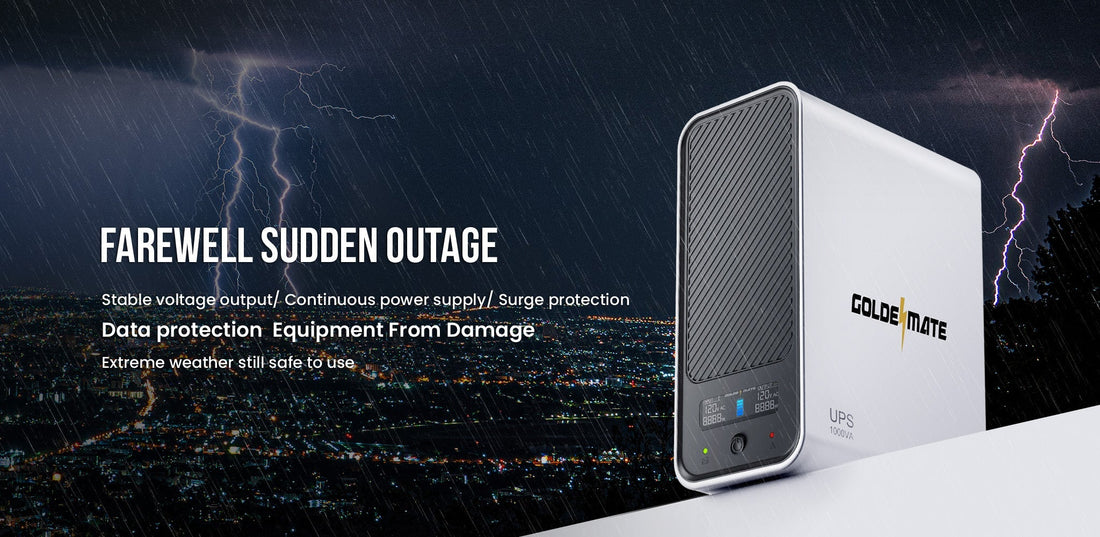
Energy-Efficient UPS Models for Eco-Friendly Power Backup
Share
Uninterruptible Power Supplies (UPS) are crucial devices designed to provide backup power during outages and protect sensitive electronics from voltage fluctuations. With growing concerns about energy consumption and its environmental impact, energy-efficient UPS models have gained significant attention. These systems not only ensure uninterrupted power but also align with eco-friendly initiatives by reducing energy waste and operational costs. This article explores energy-efficient UPS models, their benefits, and how they contribute to a sustainable future.
The Role of UPS in Modern Power Management

Critical Applications of UPS
UPS systems play a vital role in various settings, from residential and business environments to industrial applications. They are indispensable in data centers, medical facilities, and remote work setups where uninterrupted power is critical to maintaining operations and safety. In homes, they safeguard essential electronics such as routers, personal computers, and home automation systems.
Challenges with Traditional UPS Models
Despite their importance, traditional UPS models come with drawbacks. Many older systems have high energy consumption rates, leading to increased electricity bills and environmental impact. Additionally, these systems may lack the scalability needed to adapt to growing power demands, making them less suitable for modern, dynamic energy requirements.
Features of Energy-Efficient UPS Models
Advanced Power Management Technologies
Energy-efficient UPS models incorporate advanced technologies like high-efficiency inverters and low-energy-loss circuits. These innovations minimize power wastage, ensuring that the system operates optimally with minimal energy input.
Compatibility with Renewable Energy Sources
Modern UPS systems are designed to integrate seamlessly with renewable energy sources such as solar panels and wind turbines. Hybrid operation modes allow these systems to switch between conventional grid power and renewable energy, optimizing energy use and reducing dependency on non-renewable resources.
Energy Star and Industry Certifications
Energy-efficient UPS models often come with certifications like Energy Star, which validate their adherence to strict energy-saving standards. These certifications provide consumers with confidence in their eco-friendly choice and help businesses meet sustainability goals.
Benefits of Energy-Efficient UPS Systems

Environmental Impact
Energy-efficient UPS systems significantly reduce greenhouse gas emissions by consuming less power and supporting renewable energy sources. This reduction aligns with global sustainability initiatives aimed at combating climate change.
Economic Advantages
The lower power consumption of energy-efficient UPS models translates to cost savings. Reduced electricity bills, extended battery life, and lower maintenance expenses make these systems a financially sound investment in the long run.
Enhanced System Performance
Energy-efficient UPS models often feature faster switchover times, ensuring a seamless transition during power outages. Their reliability is especially critical in applications like healthcare and data centers, where even a momentary loss of power can have dire consequences.
Popular Energy-Efficient UPS Models in the Market
Overview of Leading Brands
Several leading brands have embraced energy efficiency in their UPS designs. Companies like APC by Schneider Electric, CyberPower, and Eaton offer models that combine high performance with energy-saving features.
Highlighting Key Models and Features
-
APC Smart-UPS On-Line Series: Known for its 99% efficiency, this model is ideal for businesses requiring reliable backup power.
-
CyberPower EC850LCD: Features an eco-mode that reduces energy consumption by up to 75% when idle.
-
Eaton 5PX: Offers advanced battery management and integration with renewable energy systems.
Cost Comparison and ROI Analysis
While energy-efficient UPS models may have a higher upfront cost, their long-term benefits outweigh the initial investment. Lower operational costs and extended equipment lifespans contribute to a faster return on investment.
Factors to Consider When Choosing an Eco-Friendly UPS
Power Requirements
Selecting a UPS with the right capacity is essential. Overestimating power needs can lead to unnecessary energy consumption, while underestimating can result in insufficient backup during outages.
Scalability and Flexibility
An eco-friendly UPS should be adaptable to future needs. Systems with modular designs allow for easy scalability, accommodating the growth of businesses or increased power demands.
Integration with Renewable Energy Systems
Future-proofing your UPS investment involves ensuring compatibility with renewable energy sources. This capability enables a transition to greener energy options as they become more accessible.
Steps to Maximize the Energy Efficiency of Your UPS

Proper Installation and Maintenance
Professional installation and regular maintenance are crucial for optimizing the performance and lifespan of a UPS. Keeping batteries in good condition and ensuring proper ventilation can significantly enhance efficiency.
Using Eco-Modes and Power-Saving Features
Many energy-efficient UPS models come with eco-modes that optimize power usage during low-load conditions. Activating these features can lead to substantial energy savings.
Upgrading to Lithium-Ion Batteries
Lithium-ion batteries are more efficient and have a longer lifespan compared to traditional lead-acid batteries. Upgrading to these batteries reduces the overall environmental impact and improves system performance.
Future Trends in Eco-Friendly UPS Solutions
Advancements in Battery Technology
Emerging battery technologies, such as solid-state and flow batteries, promise improved energy density and efficiency. These innovations could revolutionize the UPS industry by providing more sustainable power solutions.
AI and IoT Integration
The integration of Artificial Intelligence (AI) and the Internet of Things (IoT) is enabling smarter UPS systems. These technologies allow for predictive maintenance, load optimization, and remote monitoring, further enhancing energy efficiency.
Growth of Sustainable Energy Solutions
As decentralized energy systems and microgrids gain popularity, UPS models that integrate seamlessly with these solutions will become more prevalent. This trend supports a shift towards localized and sustainable power generation.
Conclusion
Recap of Key Points
Energy-efficient UPS models are a pivotal component of modern power management. Their advanced features, environmental benefits, and cost-effectiveness make them an ideal choice for eco-conscious consumers and businesses.
Encouragement for Adopting Eco-Friendly Solutions
Investing in an energy-efficient UPS not only safeguards your devices but also contributes to a sustainable future. By reducing energy consumption and supporting renewable energy, these systems help combat climate change.
Call to Action
Evaluate your power backup needs and consider transitioning to an energy-efficient UPS system today. By making this choice, you can enjoy reliable power while supporting global efforts toward a greener planet.